
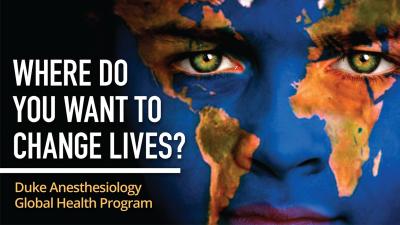
GLOBAL HEALTH: Blogs from Abroad
GHANA: Making a Difference 5,365 Miles from Durham.
Ilhan Eli, MD | FELLOWSHIP CLASS OF 2023
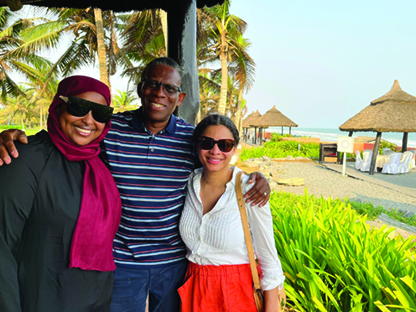
In February, I had the incredible opportunity to participate in my very first global health trip to Ghana. The experience left me with unforgettable memories that I will always cherish and that have had a positive and lasting impact.
During the two-week trip, we spent half of our time at Tema General Hospital, where we focused on improving maternal care during and after cesarean delivery and gynecological procedures. One of the most significant lessons we taught the care team was appropriate dosing for intrathecal opioids and utilizing multimodal analgesia for postoperative pain control. Additionally, we helped change the current practice of having mothers lie flat for six hours post-cesarean to prevent spinal headache and hypotension, to having them sit up immediately in the Post-Anesthesia Care Unit to help facilitate neonate bonding and decrease Neonatal Intensive Care Unit admissions. Overall, the nurse anesthetists were very appreciative and open to receiving helpful tips on how to improve care for their patients. We were able to witness practice changes happen in real time after our training sessions.
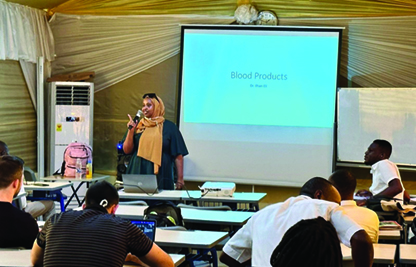
During the second half of the trip, we spent time observing the anesthesia teams at the Greater Accra Regional Hospital and taught very bright anesthetist students about blood products, respiratory mechanics, monitors utilized in the Intensive Care Unit, and burn management at the Ridge Hospital Nurse Anesthesia School. While in the operating rooms, I witnessed firsthand how the hospital staff made the best use of their limited resources. Even with limited supplies, they managed to think about the big picture of utilizing their resources to provide for the population of patients instead of giving one patient all the medications they had available. I also witnessed the use of thiopental for induction during a case, which is a drug I have only ever read about in anesthesia textbooks. Furthermore, it was interesting to see how the hospital systems are structured and how patients are supposed to pre-buy most of the medications they will need for their procedure, as well as bring in items from home including clothes, sheets, food, and toiletries prior to admission into the hospital. It was an eye-opening experience to see how they can make do with what they have.
Outside of the hospital, we were able to explore the city of Accra. As a group, we experienced the enriched cuisine, culture, art, music, and most importantly, the traffic. My interactions with the Ghanaian people were nothing short of positive. They are very welcoming and hospitable. We visited historical sites such as Kakum National Park, Elmina Castle (the biggest slave castle for transatlantic slave trade), and the Ghana National Mosque (the second largest mosque in West Africa). Dr. Adeyemi Olufolabi was kind enough to arrange for me to pray with the Muslims in Accra in the Grand Mosque on a Friday, which is the day of worship for Muslims. It was a wonderful experience to see different cultures all come together to observe the Friday lecture and pray in unity.
I would like to thank Dr. Olufolabi for making this global health experience one that I will never forget and Dr. Jennifer Dominguez for making this trip happen during our fellowship. I’m grateful to have participated in such a meaningful experience, and I will end this with Dr. Olufolabi’s favorite saying for the trip, “T.I.A. This is Africa.”
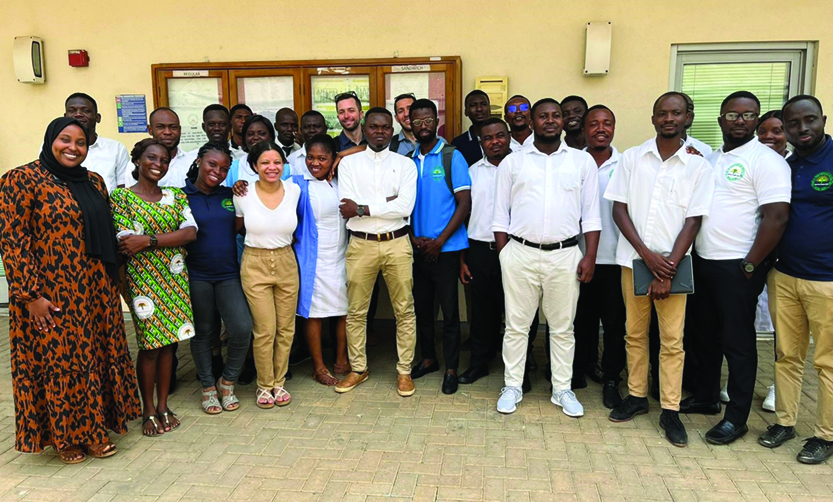
Liliane Ernst, MD | FELLOWSHIP CLASS OF 2023
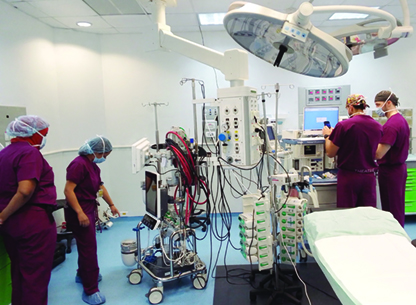
This past February, I had the opportunity to travel to Ghana with Dr. Adeyemi Olufolabi and the organization Kybele. In Ghana, our goals included teaching nurse anesthesia students, observing anesthetic care on labor and delivery as well as in the main operating rooms, helping introduce enhanced recovery after cesarean delivery (ERAC) protocols, and helping collect data for quality improvement (QI) initiatives. It was especially meaningful to be involved in the implementation of ERAC and QI initiatives in order to help improve efficiency and minimize cost in a setting where resources are limited.
What I appreciated most about our work there was the focus on self-sustaining improvements. The trip was not a self-limited “drop in” mission, but the goal was to provide the participating hospitals with the knowledge and skills needed to make sustainable improvements in anesthetic care even after we left. Seeing how outcomes and patient satisfaction were improved by rolling out small changes, like allowing mothers to breastfeed immediately after a cesarean, was very empowering. Moreover, one of my biggest clinical takeaways was that providing safe and effective anesthesia can be done with simple resources, and perhaps we sometimes overcomplicate things in our resource rich environment.
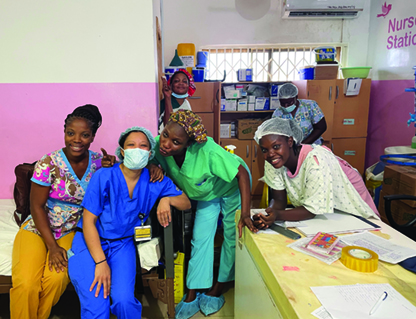
Outside of the clinical experience, my favorite part of the trip was the people I got to meet. What struck me the most was that everyone in Ghana was entrepreneurial. From food blogging to roofing companies, the majority of people had their own side businesses, and there is a general atmosphere of growth and development. It was very exciting to feel how much potential Ghana has.
My experience in Ghana was one of the most impactful experiences I have had in health care. I am so grateful to Dr. Olufolabi and the department for making this trip a possibility.
Benjamin Andrew, MD, MHS | RESIDENCY CLASS OF 2023
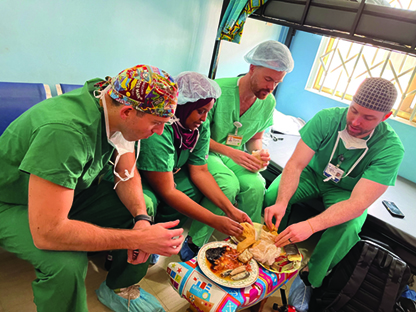
Every year during my time as a Duke Anesthesiology resident, like clockwork, CA-3s would appear back in the resident lounge having been noticeably absent for the month prior. “How was it?” everyone would invariably ask—to which the responses were unanimously some version of “it was incredible – I didn’t want to come back.” This was, of course, my first exposure to the global health rotation with Dr. Adeyemi Olufolabi. Early in residency, before having rotated through labor and delivery, I hadn’t yet met Dr. O, but I somehow felt as if I knew him, having heard the endless stories of other residents’ trips with him and the incredible work he was doing year after year in Africa. When I finally did get the chance to work with him (“on a typical, peaceful and quiet, week of labor and delivery nights”), I knew without a doubt that I had to sign up to travel with him.
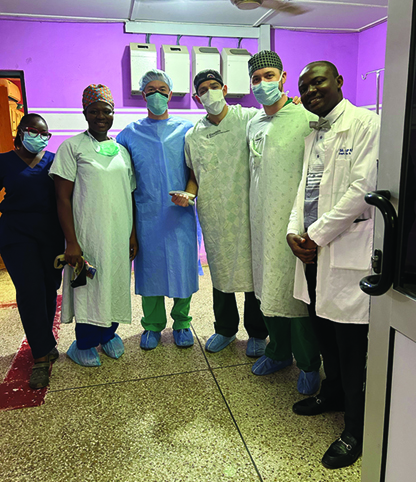
For our trip in February, we traveled to Ghana, where we worked with the Kybele organization to learn from, and teach, a multidisciplinary group of clinicians and health care workers—all in an effort to improve maternal and neonatal outcomes after childbirth. Our day-to-day experiences were more varied than I could have ever anticipated —delivering classroom-based lectures, rounding in the Intensive Care Unit, and both observing and teaching in the perioperative environment of three separate facilities. What was constant, though, was the openness and welcoming nature of our Ghanaian hosts. While a limited and, at times, a complete lack of important resources was easy to appreciate throughout our time in Ghana, it was the resiliency of the people that left the greatest impression on me. We met so many motivated, talented and truly exceptional health care workers who, without fail, were relentlessly optimistic about the future of their system and who were tirelessly working to help their patients.
Even outside the hospital we found friendly and welcoming Ghanaians at every turn as we learned about their history, culture, cuisine, and their triumphs and struggles as a nation. Through the entirety of our trip, Dr. O went out of his way to enrich our limited time in Africa and, as he put it, give us the “true global health experience.” It was an experience I will never forget.
And so, at the end of February, after a life- and perspective-changing trip, just like the CA-3s I saw all the years prior, I walked back into the lounge. It was incredible – I didn’t want to come back.
Alex Girden, MD | RESIDENCY CLASS OF 2023
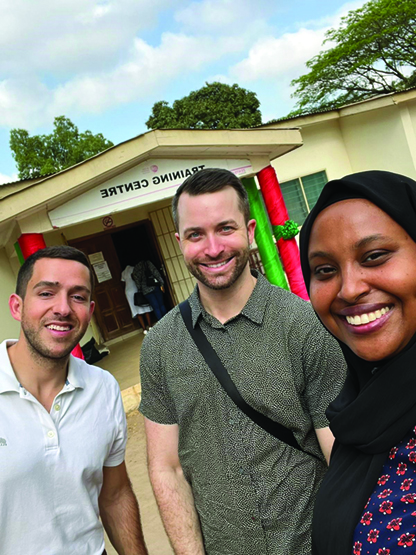
It is rare that you have an opportunity to spend an extended period encapsulating yourself within another people’s culture. When I heard about the global health opportunity all the way back when I was applying to residency, I immediately wanted to be involved. As I prepared myself for the trip to Ghana, I had simple goals: go with the flow, be adaptable and try something new every day.
As I sit here reflecting on the experiences I have had, I am surprised by my two biggest realizations during this trip. Foremost, my time there helped me remember why I chose to be in medicine. At some point, we all started our journey with the intention of helping others. The people of this country live that message every day. The health care workers of this country are at a disadvantage; whether it be staffing or lack of resources, there is a limitation to the care they can provide. Yet, they never once complain or make excuses. They come to the hospital every day with pride, with good intentions and a love for their patients. During the time I spent with these workers, all they asked was for advice on how they can provide better care. There is a pride the people of Ghana have for their work and their institution that is overlooked here in the United States.
Secondly, I was amazed by which we were welcomed with open arms by the Ghanaian people. The people we met wanted us to know and understand the place they proudly call home. Whether it was sharing their life stories or an authentic meal, the only hope was that we would better understand their love for their country. I am forever grateful for my time abroad and all those who were kind enough to share their experiences with me. I hope to remember that when you open yourself to others, they will show you the same in return.
